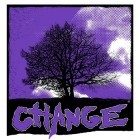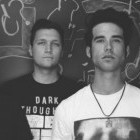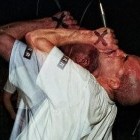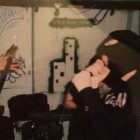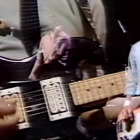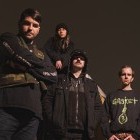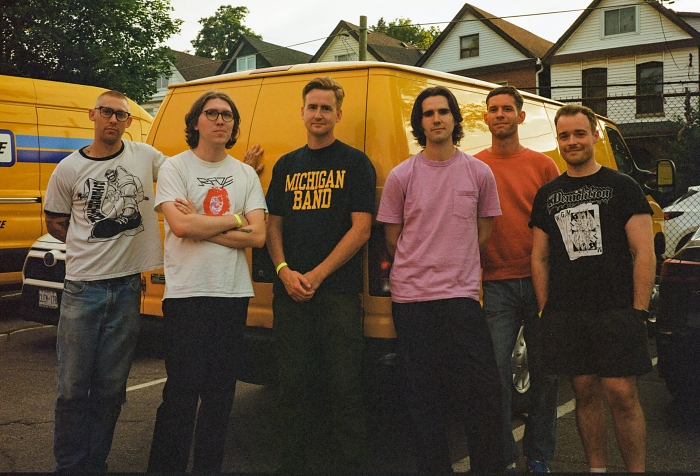
One of my favorite hardcore records of the year is Marathon, the sophmore full-length album from Mil-Spec. The follow-up to 2020's World House LP, the new collection finds the Canadian outfit delivering a refreshing balance of power and melody. There's also an almost autumnal feel to the new material that stays with you even after the last track ends.
Co-produced by Mil-Spec and Ned Russin (Title Fight, Glitterer), Marathon was released by Lockin' Out, the long-running (truly) independent record label owned and operated by former Mental vocalist Greg Wilmott.
Since I'm a big fan of what they're doing, I wanted to dig deeper into the Mil-Spec story, the making of Marathon, and the band's relationship with Greg from Lockin' Out. Thanks to guitarists Dan Darrah and Matt Laforge for their time and insight for this piece.
It’s interesting, but there’s something about Mil-Spec that has always felt a bit “mysterious” to me for some reason. For example, this new album came out without the usual months-long build-up you see from many other bands in the hardcore scene these days. Lockin' Out announced it via social media, and there it was a few days later. Is this something you guys have talked about, or just the way things have worked out for the band?
(Dan Darrah, guitar): I get why labels and bands roll out records the way they do, but it hasn’t come naturally to us. We don’t have any press acumen, and most of us don’t use social media, so unsophisticated release plans are inevitable.
This was actually the first time we did a single in advance of a record, paired with a video, and even that felt a bit odd. I don’t know — I much prefer dropping everything at once by surprise. I like that the songs are heard in the context they’re intended to be heard in.
Matt Laforge (guitar): For years, no member of the band ever pushed for us to have a presence on social media, so we never had one. Our absence from those platforms might create the (understandable) impression that we’re trying to prove a point or cultivate secrecy for its own sake, but really there’s no agenda, there’s no anonymity manifesto. It’s all by default.
And when it comes to releasing records, especially this latest one, we query press people, we try to do interviews, we did the video for “The Days Don’t End,” as Dan said — we put ourselves out there just like everyone else. The difference is we’re not very good at it.
Personally, as the older member of the band, the resident Gen Xer, I still haven’t gotten used to how businesslike hardcore bands have become in their promo and marketing. The idea that any DIY hardcore band or label would “announce” anything or “roll out” a release was unheard of when I was young in the '90s.
On the other hand, bands back then were just as thirsty for attention as they are now; they just didn’t have as many tools to draw attention or keep track of how much of it they were drawing. Things have become a lot more rationalized and quantifiable.
I’ve been playing Marathon a ton since it came out earlier this month. Much like your earlier releases, there’s a certain melancholia to the feel of the material throughout the album. I can’t quite put my finger on it. Is it the poetic lyrical style? Maybe it’s something in the chord choices and arrangements. What’s your take on the "Mil-Spec Style” and how you approach songwriting for the band?
(Dan): When we started the band in 2015, we had a distinct and specific “democore” goal in mind — loose, scrappy '80s hardcore, lo-fi recordings, allusive songwriting, etc. — but pretty quickly felt pulled in other directions. The decisive reason we sound how we do is because we let ourselves be pulled in those directions, letting intuition and instinct take the wheel.
During the writing of the When the Fever Broke tape (2017), Matt and I began to break with our more rigid form of songwriting and started looking for inspiration in Quicksand and Supertouch, then later Leatherface and Hüsker Dü. The songs began to get a bit more tuneful and layered, often using full six-string chords, and we started to play old songs a bit differently — the demo track “A Separation,” for example, became more like a Neil Young song when we re-did it for the DDM Sessions (2019).
Matt and I have always been captive audiences to one another’s crackpot ideas, which is true of the whole band too, and that’s allowed us to develop in unsuspected ways. Over the last few records we haven’t really discussed or tried to agree on a broader “style” to shoot for, but we talk about the components of that style at length. Deciding what goes in is more important than understanding what comes out. I think coherence can emerge naturally from the most chaotic or stylistically busy albums, so I try not to sweat the overall arc too much.
The lyrics are for sure an important element to us, and right from the demo Matt set the stage for the kind of tone we’d use throughout the band’s lifespan. He still writes the bulk of the lyrics, but I’ve taken on a few songs over the last two records. Because he and I share a lot of aesthetic interests and inspiration, the whole activity is very satisfying. He’s a great editor, too, and helps bring the best stuff out of me.
Matt: I’m really glad that Dan took on more of the lyrics on Marathon. By the time we were working on World House (2020), I had begun to lapse into a bit of a routine, or shtick, with the lyrics. On that record, I could sometimes feel myself trying to gin up that melancholic element, which on the earlier records had come more naturally and organically.
Dan wrote the lyrics for a couple of songs on World House, and his approach helped balance things out. By now, with Marathon, a big part of the Mil-Spec style is the mix of his lyrics and mine.
Regarding some of the chord voicings, we’re not exactly Joe Jackson or Steely Dan, but we definitely try to have some texture in the guitars. Dan has a good feel for that stuff. It can be a pain in the ass in the studio, though.
Any band that plays gainy distorted guitar but also wants to convey more than two notes per chord will recognize the problem of trying to record those extra smartypants notes and open strings so that they’re actually audible in the mix.
We’ve become believers in the Klon Centaur overdrive pedal because, true to its reputation, it really does let you have it both ways, crunch and color.
You worked with Ned Russin in the studio to make Marathon. He’s another musician who clearly knows a thing or two about leaning into the more emotive aspects of hardcore. Why did you choose to collaborate with him on the project, and how deeply did you discuss the songs before you even started recording everything? Maybe the latter came during the actual tracking instead of beforehand?
Dan: We’d already gotten through most of recording when we enlisted Ned, who heard the unmixed bounces a few weeks before. We realized we had bit off more than we could chew on some of the Marathon tracks and needed his expertise. "Who is Who" in particular was a big stretch for us in a lot of ways — vocally, sonically, stylistically — and we had lots of questions about putting the finishing touches on the other tracks.
We’re perfectly fine musicians, but we know very little about what’s required to achieve a particular sound or feel. And in some cases we didn’t even have a particular sound or feel in mind, but rather a more inchoate set of ideas that needed untangling. Ned helped with all of that. He offered some singing ideas, worked with Jake, our drummer, to develop an early version of the "Belle Époque" beat, and can be heard on various group vocal parts.
Matt: Yeah, what happened with Ned was, in the midst of struggling with the “last mile” of the record, we called him and asked if he’d come to the studio and let us play him all the tracks and stare at him pleadingly. He was happy to do it. He’s a pal. In the end, he made a lot of concrete contributions, more than enough to justify a co-producer credit.
Now, having given him that credit, we find ourselves trading on his name a bit, which feels a little tacky. We weren’t looking for a co-sign or a namebrand producer. We wanted to self-produce but we hit a wall and needed substantive help, so we brought in someone from our friend group who had the right experience and temperament.
Arthur Rizk, the mixer, was another contributor whom we trusted to take our messy basic tracks and give back to us something more coherent and fully realized. He’s incredibly skillful and professional. We were lucky to have him involved. Greg Willmott hooked that up for us.
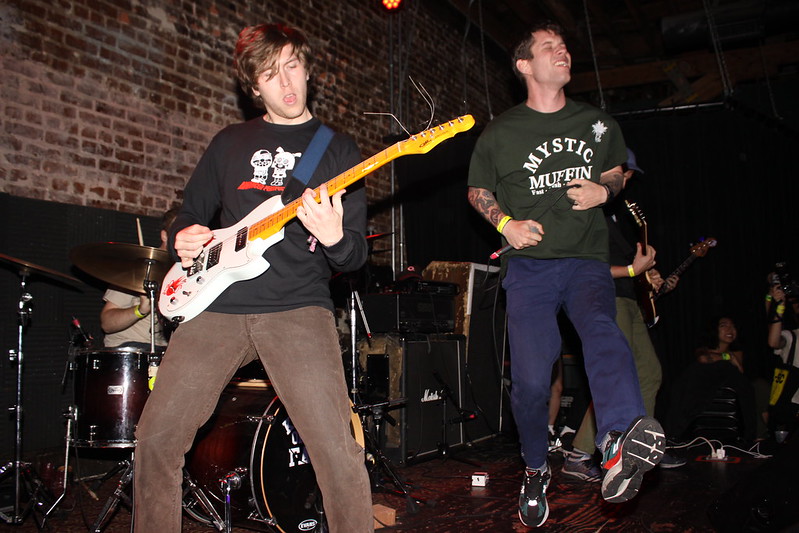
Marathon feels like a complete thought, something I found refreshing, especially since many hardcore albums come off like singles compilations at times. There’s the spoken-word track "Belle Époque” that also weighs heavily into the album’s overarching spirit. What can you tell me about that song? I wouldn’t be surprised if it was the toughest one to put together in the studio since it’s so layered. Also, if you care to share anything about its inspiration, I would love to hear it.
Dan: The production of “Belle Époque” was a bit involved. It started with the base layer, which is a synth track that Codey recorded using the chords from “Foreword.” Ned and Jake then recorded a bunch of beats in the studio on various sample pads, and after that we handed everything over to Codey’s producer friend Shawn Allison, who reworked it into a more linear song.
Arthur brought it across the finish line sonically. We had six or seven people take a pass reading Matt’s script before deciding on Sophie, Andrew’s wife, who’s from Québec City and could do certain passages in French, which we really liked. We’re thrilled with how it turned out and that it’s resonating with people.
Matt: Jake really wanted electronic music on the album, and we were all amenable. But I was wary of shoehorning an instrumental dance track into the back half of the album and letting it run. I didn’t want a contrived non-sequitur, like on Monty Python: “And now for something completely different.” But I didn’t have a better idea, not until late in the process, after the basic parts of the track had already been programmed and roughed in. I was at the neighborhood pool with my wife and sons one day, and I suddenly had the idea to put a monologue on top of the instrumental.
I think I was trying to pander to Andrew, our singer, with this idea, because it’s inspired by a lot of things he and I both like: Arab Strap’s “First Big Weekend,” especially the 2016 EDM remix; latterday Mark Kozelek/Sun Kil Moon, where he does spoken-word about ordering sandwiches and arguing with airline employees; that Kanye West song "Last Call," where he spends 10 minutes at the end summarizing his pre-Roc-a-Fella career and explaining how he got his deal. Telling about our last weekend with Riley felt like the obvious approach. We tried really hard not to be ghoulish about it. I think it turned out well.
Dan: I forgot the idea for an electronic song originated with Jake. On this record he got two more wishes than his normal allotment of zero: that, and a DJ sleeve for the cover. If things continue on this path we’ll be Nature and Organisation by 2025 [laughs].
Tell me a bit about your relationship with Greg Wilmott of Lockin’ Out. How did you guys initially connect and what is it about his approach to the label that makes it the perfect fit for what you do with Mil-Spec?
Matt: I met Greg in fall 2002, when my old friend Sam Reiss, Snake America himself, booked Mental in Montreal, where Sam was going to college at McGill. I took the bus up to that gig from Ottawa, where Sam and I are both from.
After that night, Sam got really close with Mental Crew. I drove him down to Boston in June of 2003, the day of the first RIghteous Jams show, because he had lined up an internship at Harvard Medical School, or somewhere similarly prestigious, and would be bunking with Greg and Scace that whole summer, at their apartment in Allston.
So through Sam, I knew Greg well enough that he would elaborately dap me and affectionately insult me whenever I’d see him around, but it was a casual acquaintanceship. I was a second- or third-tier Lockin’ Out affiliate by virtue of being Sam’s buddy.
Fast-forward a bunch of years, and now Mil-Spec is up and running. As Dan said, we’re a product of democore, and Gil from Free Spirit and Intent was one of our early champions. Gil A&R’d us with Greg, brokered the signing just after we did the Fever tape in 2017.
Why is Lockin' Out the perfect fit? Because Greg is a cool person who we respect, and he doesn’t put any pressure on us or expect us to do anything we don’t want to do. He doesn’t insist that we do national tours, or do social media, or hustle our releases in any way. If anything, he’d probably prefer we do less promo. He has a worldwide reach and a lot of goodwill vested in his label, which means we get more attention, more of the benefit of the doubt, than we’d get almost anywhere else.
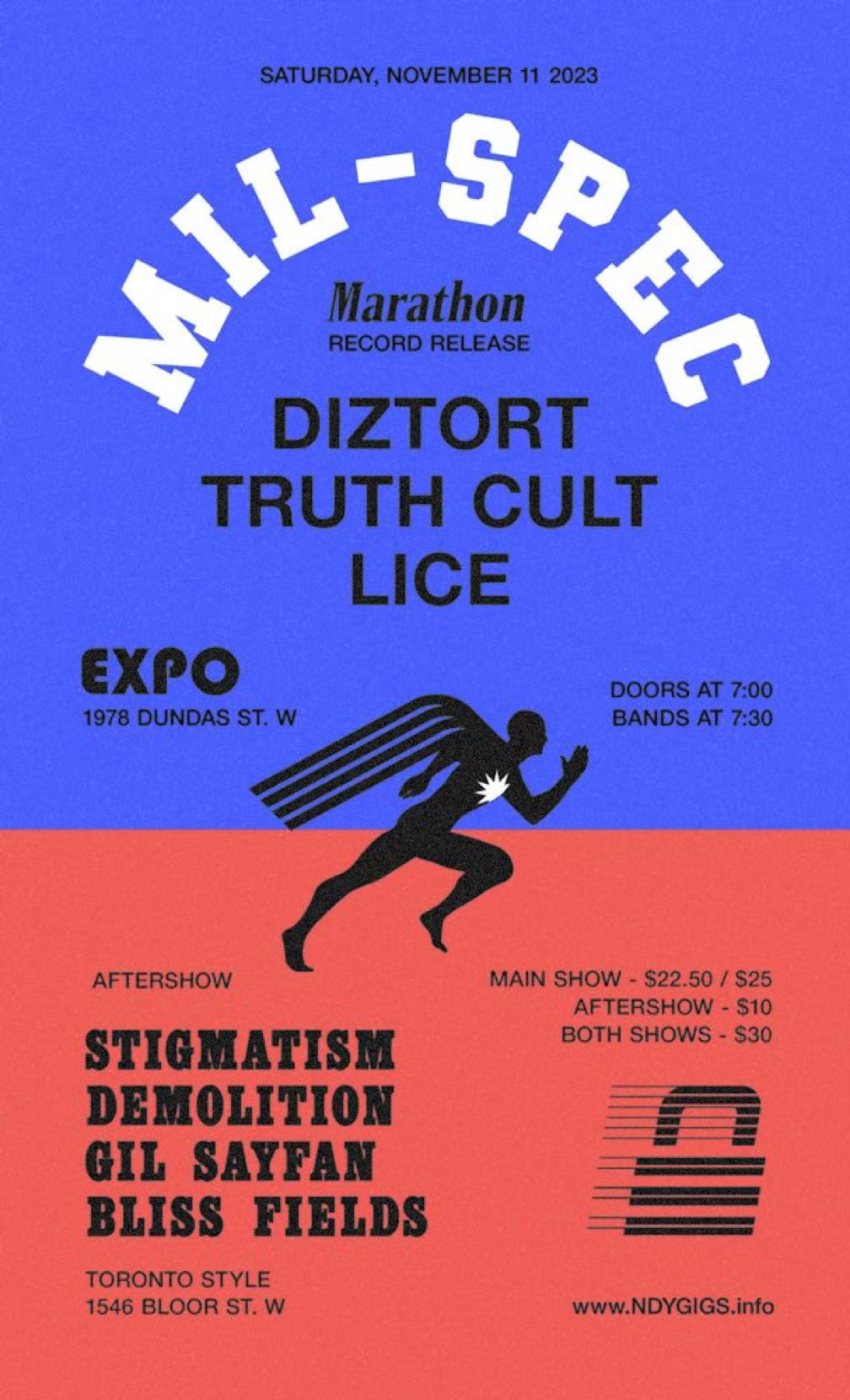
What’s the plan for the band now that the album is out? The last time I saw the band play live was here in Los Angeles when you opened for Higher Power. Can we expect some more shows in the near future?
Dan: Yeah, definitely. We've got a few ideas for 2024 tours percolating. I’d like it to be a busy year.
***
Marathon is available now via Lockin' Out.
***

Tagged: mil-spec


